Related Research Articles

Goofy is a cartoon character created by the Walt Disney Company. He is a tall, anthropomorphic dog who typically wears a turtle neck and vest, with pants, shoes, white gloves, and a tall hat originally designed as a rumpled fedora. Goofy is a close friend of Mickey Mouse and Donald Duck, and is Max Goof's father. He is normally characterized as hopelessly clumsy and dim-witted, yet this interpretation is not always definitive; occasionally, Goofy is shown as intuitive and clever, albeit in his own unique, eccentric way.
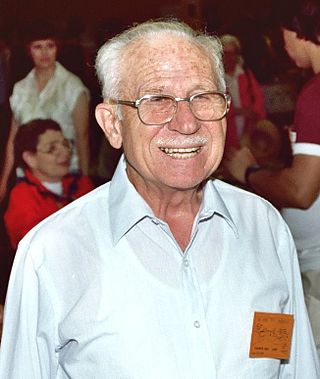
Clarence Charles "Ducky" Nash was an American voice actor and impressionist. He is best remembered as the original voice of the Disney cartoon character Donald Duck. He was born in the rural community of Watonga, Oklahoma, and a street in that town is named in his honor. In 1993, he was posthumously made a Disney Legend for his contributions to Walt Disney films.

Chip and Dale are a cartoon duo of anthropomorphic chipmunks created by The Walt Disney Company, who debuted in the 1943 short film Private Pluto.
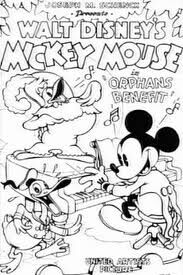
Orphan's Benefit is an American animated short film produced by Walt Disney Productions in black-and-white. It was first released in 1934 and was later remade in Technicolor in 1941 under the corrected title Orphans' Benefit. The cartoon features Mickey Mouse and his friends putting on a vaudeville-style benefit show for a group of unruly orphans. It contains a number of firsts for Disney, including the first time in which Mickey Mouse and Donald Duck appear together, and was the 68th Mickey Mouse short film to be released, and the sixth of that year. It was also the cartoon which had the first story to be written that featured Donald Duck, though it was the second Donald Duck short to be produced and released, after The Wise Little Hen.

The Walt Disney Company has produced an anthology television series since 1954 under several titles and formats. The program's current title, The Wonderful World of Disney, was used from 1969 to 1979 and again from 1991 onward. The program moved among the Big Three television networks in its first four decades, but has aired on ABC since 1997 and Disney+ from 2020 to 2023.
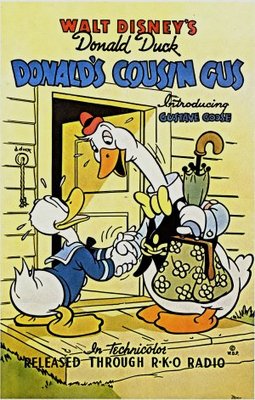
Donald's Cousin Gus is a Walt Disney cartoon released on May 19, 1939. Gus Goose debuted as a recurring character in Al Taliaferro's Donald Duck newspaper comic since 9 May 1938.
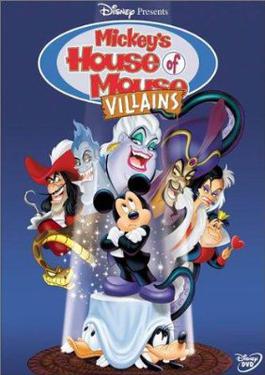
Mickey's House of Villains is a 2002 American direct-to-video animated comedy-horror film produced by Walt Disney Television Animation. It is based on the animated television series House of Mouse, and serves as a stand-alone sequel to the direct-to-video animated film Mickey's Magical Christmas: Snowed in at the House of Mouse, starring Mickey Mouse, Donald Duck, Minnie Mouse, Goofy, Daisy Duck, and Disney Villains that appeared in past Disney productions. It was released on both VHS and DVD by Walt Disney Home Entertainment on September 3, 2002.
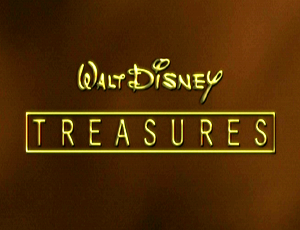
Walt Disney Treasures is a series of two-disc DVD collections of Disney cartoons, television episodes and other material. They cover material from the studio's earliest days to its more recent work. There were nine waves, each containing two to four sets, for a total of 30 titles. All content is presented uncensored and uncut with digitally restored picture and remastered sound.
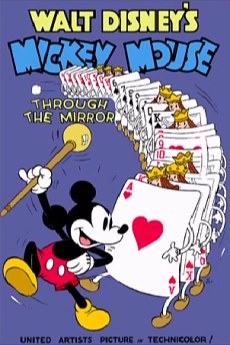
Thru the Mirror is a 1936 American animated short film directed by David Hand from a story by William Cottrell and Joe Grant. In this cartoon short, Mickey Mouse has a Through the Looking-Glass-parody-like dream that he travels through his mirror and enters a topsy-turvy world where everything is alive. While there, he engages in a Fred Astaire dance number with a pair of gloves and a pack of cards, until the cards chase him out of the bizarre world. Produced by Walt Disney Productions and released by United Artists, it was the 83rd Mickey Mouse short film to be released, the fourth of that year.

Mickey Mouse is a series of American animated comedy short films produced by Walt Disney Productions. The series started in 1928 with Steamboat Willie with 2013’s Get a Horse! being the last in the series to date, otherwise taking a hiatus from 1953 to 1983. The series is notable for its innovation with sound synchronization and character animation, and also introduced well-known characters such as Mickey Mouse, Minnie Mouse, Donald Duck, Daisy Duck, Pluto and Goofy.

The Reluctant Dragon is a 1941 American live-action/animated anthology comedy film produced by Walt Disney, directed by Alfred Werker, and released by RKO Radio Pictures on June 27, 1941. Essentially a tour of the then-new Walt Disney Studios facility in Burbank, California, the film stars Algonquin Round Table member, film actor, writer and comedian Robert Benchley and many Disney staffers such as Ward Kimball, Fred Moore, Norman Ferguson, Clarence Nash, and Walt Disney, all as themselves.
The first wave of Walt Disney Treasures was released on December 4, 2001. It includes four different DVD sets.
The second wave of Walt Disney Treasures was released December 3, 2002. This was the final wave with the tin's individual number embossed on the tin.
The third wave of Walt Disney Treasures was released on May 18, 2004. It was originally planned to be released in December 2003, but was delayed for almost half a year in order to meet an increased demand with a higher number of tins produced. This wave was the first to have a certificate of authenticity with the individual number of the tin on it, replacing the number embossed on the tin. This was the final wave released with side straps.
The fifth wave of Walt Disney Treasures was released on December 6, 2005. Starting with this wave the DVD cases are now single opening, but the same size as the previous.
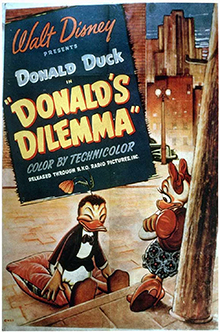
Donald's Dilemma is a Walt Disney Studios animated cartoon directed by Jack King and starring Donald and Daisy Duck. It was originally released on July 11, 1947 in the United States. The title of this short is somewhat of a misnomer. Although Donald is the official headliner for this cartoon, Daisy is the actual protagonist. The dilemma of the title is actually offered to her, not to Donald.
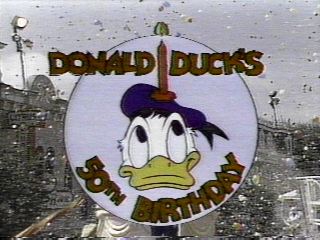
Donald Duck's 50th Birthday is a television special broadcast on The Magical World of Disney on November 13, 1984 on CBS. As the title suggests, it was produced to celebrate the 50th anniversary of the Donald Duck character, who first appeared in the Walt Disney short The Wise Little Hen in 1934.
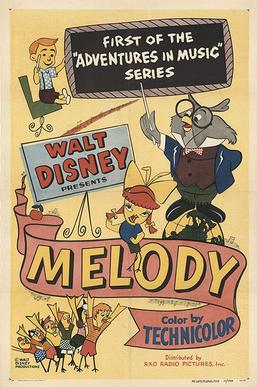
Melody is an American animated short film produced by Walt Disney Productions and directed by Ward Kimball and Charles A. Nichols. Originally released on May 28, 1953, this film was the first in a proposed series of animated cartoon shorts teaching the principles of music, called Adventures in Music. Only one other entry in the series was produced, Toot, Whistle, Plunk and Boom, which was released later that same year, winning an Academy Award for Best Short Subject (Cartoons) the following year.
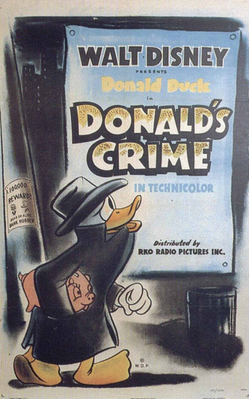
Donald's Crime is a 1945 American animated short film produced by Walt Disney Productions and released by RKO Radio Pictures. The cartoon, which parodies film noir crime dramas of the time, follows Donald Duck as he struggles with guilt after stealing $1.25 from his nephews. The film was directed by Jack King and features original music by Edward H. Plumb. The voice cast includes Clarence Nash as Donald, Huey, Dewey, and Louie, Ruth Clifford as Daisy Duck, and Harry E. Lang as the off-stage voice of Donald's conscience. This was Blondell's first performance as Daisy and marks the debut of the character's "normal" voice. Previously in Mr. Duck Steps Out, Daisy had been voiced by Nash using a voice similar to Donald's.
References
- ↑ Cotter, Bill (1997). The Wonderful World of Disney Television. Hyperion Books. pp. 147, 542. ISBN 0-7868-6359-5.
- ↑ "Behind the Scenes at the Walt Disney Studio DVD Review". DVD Dizzy. Retrieved 19 February 2021.